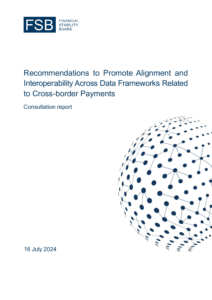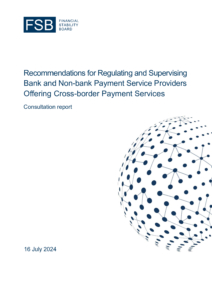The views expressed in these remarks are those of the speaker in his role as FSB Chair and do not necessarily reflect those of the FSB or its members.
Thank you for inviting me to speak today. I am sorry that I cannot be there with you in person.
Just as Rome wasn’t built in a day, the splendour of Florence didn’t arise overnight. Both cities are testaments to the power of time, artistry, and persistent dedication.
At the FSB, we don’t build anything alike – but we are ambitious in a similar way. And we take on projects that reach the same level of complexity. The G20 Roadmap to enhance cross-border payments are not immediate and easy tasks. The Roadmap is ambitious in its goal to improve the cost, speed, availability and transparency of cross-border payments globally.
The complexity of this undertaking cannot be overstated. The cross-border payments ecosystem is made up of countless individuals, businesses, and governments, relying on a network of national and regional payment services providers and infrastructures. And these themselves are subject to the laws and regulations of every jurisdiction in which they operate.
As most of you will likely recall, the FSB and our partners, including the CPMI, began this journey in 2020. We spent the first two years exploring a wide range of possibilities to address the frictions that cross-border payments face. This included practical arrangements, operating practices, technological solutions and regulatory changes.
The work involved stocktakes and in-depth analyses. And it produced best practices, and recommendations for how to improve existing arrangements and to develop potential new arrangements.
In 2021, we published quantitative targets to define the ambition of the Roadmap and establish a shared, concrete vision of the goals to be achieved. We then identified the actions we would need to take to achieve the targets by end-2027. Based on this, we transitioned, in February 2023, to a practical implementation phase, consisting currently of 15 priority actions.
These priority actions are designed around three interconnected themes. The first theme focuses on improving payment system interoperability and extending RTGS operating hours and access policies. The aim of this is to shorten transaction chains and reduce related frictions. The CPMI leads the work in this area. And we just heard about the work underway on interlinking fast payment systems, including technological innovations in this area. I just want to underscore the value of this work.
The second theme is to promote consistency in legal, regulatory and supervisory frameworks for cross-border payments. Because the opposite can be a significant source of frictions in cross-border payments. And unnecessarily increase the complexity and, consequently, the cost of cross-border payments. This is not to suggest that laws, regulations or supervisory practices should necessarily be relaxed or constrained. They serve important public-policy goals. However, where unnecessary frictions are created, we should seek to reduce or alleviate them.
For our part in the FSB, next week, we will publish a report for public consultation on this topic. It consists of recommendations to strengthen consistency of the application of regulation and supervision to banks and non-banks providing cross-border payment services. We want to promote common minimum standards on a basis of “same activity, same risk, same regulation”. In doing so, we aim to create an environment of trust for consumers, banking intermediaries and infrastructure providers, including fast payment systems.
Actions under the Roadmap also include work by the Financial Action Task Force, or FATF, to strengthen their guidance on anti-money laundering and combatting the financing of terrorism: AML/CFT. In February, FATF completed its guidance on beneficial ownership. Currently, it is assessing the responses to its public consultation on updating its rules on wire transfers. This way, it will take account of recent and upcoming developments in the architecture of payments systems.
Later this year, the FSB expects to announce that yet another international organisation will be joining the Roadmap ambition.
The third theme focuses on facilitating cross-border data exchange and increasing the use of standardised messaging formats for cross-border payments. The global transition to the ISO 20022 standard is underway. However, inconsistent use of the standard could limit its benefits in enhancing straight-through processing and the interlinking of payment systems.
Data lies at the heart of payments. But data standards, frameworks and formats vary significantly across jurisdictions, infrastructures and message networks. The efficient transfer of data supports cheaper, faster, and more transparent payments. And it also supports our shared interest in combatting financial crime, such as fraud and money laundering, and terrorist financing. Here, the FSB has explored the interaction between data frameworks and cross-border payments. This way, we want to contribute to greater alignment and interoperability of cross-border payments services.
Data frameworks and regulations aim to preserve the security of transactions, limit AML/CFT, and protect the privacy of citizens. However, the fragmentation in data frameworks across jurisdictions is a major barrier to automating cross-border payments and preventing fraud. Using our convening power to reach beyond financial authorities and engage with data privacy and data protection regulators, the FSB has developed a set of recommendations.
With these, we want to:
-
promote standardisation and uniform implementation of payment-related data requirements.
-
address conflicting requirements, such as those related to data privacy and to AML/CFT.
-
create trusted avenues for the cross-border flow of data while supporting data privacy.
-
And encourage progress on promising innovations to reduce frictions in cross-border payments.
Next week, these recommendations will be issued for public consultation and I encourage you to provide feedback.
Much still needs to be done by both the public and private sectors. To support jurisdictions’ enhancement of payment systems, the IMF and World Bank have launched technical assistance for cross-border payments, and encourage jurisdictions to engage with them. But no action can be conceived without global coordination and without purposeful and proactive engagement with the private sector. This event is an excellent example of engagement of public and private sector stakeholders on one of the priority actions.
In addition, the FSB and CPMI have each established a taskforce comprised of the public and private sectors. Their purpose is to facilitate the sharing of views and support a shared commitment.
At the beginning of my contribution, I talked about the targets we want to achieve by end 2027. What we need to keep on progressing towards these targets, is threefold.
-
First, we need continuous commitment from the regulatory community to finalise the work that is in progress. The FSB is committed to making sure that this happens.
-
Second, we also need a shared commitment to improving cross-border payments, both from the public and the private sector. The onus to turn some of the completed priority actions into reality rests with the private sector, with the support of the public sector.
-
Third and finally, we need specific attention to those regions and market segments that find themselves furthest from the targets. This is the case, because we may need a more in-depth understanding of the market practices and a dedicated action plan for those regions in order to see substantial progress at a global level.
Indeed, Rome wasn’t built in a day. Nor did the splendour of Florence arise overnight. They required time and dedication. Conferences like this create the necessary time – to reflect, make connections, and share insights. And above all, they provide the inspiration to stay dedicated to our ambitions – and make our goals a reality.
So let me wish you all good discussions and a lot of food for thought to inspire action once you go back home.
Thank you.

